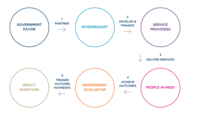Social impact bond

A social impact bond (or SIB) is a way to help fund important social programs, such as ones that feed hungry people or help take care of elderly or sick people.
When a government wants to fund a social program, it usually takes money out of its budget to pay for it. But with a social impact bond, the government works with other organizations (often private companies, charities and investors) to find ways to fund the program that don't cost the government.
For example, a group of people may want to create a program to help people find jobs. They come up with a plan to fund it and create a social impact bond. The government agrees to pay back the bond if the program succeeds in helping people find jobs and lifting them out of poverty.
The private companies, charities and investors then provide the money to pay for the program. If the program is effective at helping people, the government will give them their money back (plus maybe extra money if the program did really well). If the program is not effective, then the private companies, charities and investors won't get their money back.
When a government wants to fund a social program, it usually takes money out of its budget to pay for it. But with a social impact bond, the government works with other organizations (often private companies, charities and investors) to find ways to fund the program that don't cost the government.
For example, a group of people may want to create a program to help people find jobs. They come up with a plan to fund it and create a social impact bond. The government agrees to pay back the bond if the program succeeds in helping people find jobs and lifting them out of poverty.
The private companies, charities and investors then provide the money to pay for the program. If the program is effective at helping people, the government will give them their money back (plus maybe extra money if the program did really well). If the program is not effective, then the private companies, charities and investors won't get their money back.
Related topics others have asked about:
